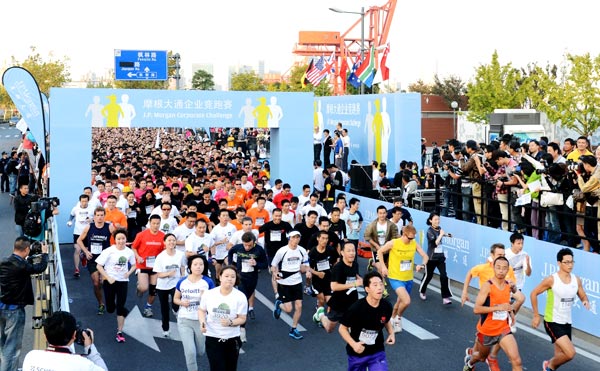Work & Work out
 |
|
More than 7,000 participants from more than 200 companies compete in the annual J.P. Morgan Corporate Challenge race in Shanghai. [Photo provided to China Daily] |
"I've joined the running event each year, and my goal is to beat my personal record," says GE China's Tu.
The Corporate Challenge is a 5.6-kilometer corporate team run. As one of the world's most renowned corporate sporting events, it aims to bring the message of a healthy lifestyle, healthy competition, teamwork spirit and philanthropy to Shanghai.
"Donations from all the participants will also be given to Right to Play with the funds targeted at improving education by providing training to trainers and offering demo classes for migrant children and youths in Shanghai. The participation of all runners and their companies will positively impact the lives of 120 migrant youths, children and 25 trainers in Shanghai," says Greg Guyett, chief executive officer of J.P. Morgan Greater China.
"We have over 100 employees participating in the race this year," says Du Long, a staff member from Bosch China, who is also the Bosch team's captain.
"Our company has a sports culture and cares about the work-life balance of employees. There are regular health lectures in our company to help promote good health. This is why we have so many people who will join the race in the first year of our participation."
Majdi Abulaban, president of Delphi Asia Pacific, says the staff at his company has been getting more physical.
"This year, more than 300 employees in our company joined the challenge, while in the first year it was only 40 employees," he says.
Most white-collar workers in China are working under huge pressure and little exercise. They are in poor condition both physically and mentally, according to various studies released by government and academic bodies.
In recent years, several young people have died from overwork, which has drawn wide attention in Chinese media. It's also reported that the average working time of Chinese is among the longest in the world.
"Nowadays, many people are spending most of their time sitting at a desk or inside an office, which will lead to a decline in overall health, especially increase the risks for chronic diseases," says Tao Li, a health expert in Shanghai, adding that adopting healthy lifestyles and carrying out wellness programs will be a key to preventing disease and also a long-term human asset management strategy for companies.
Workplace wellness programs include health education, weight management, medical screenings and onsite fitness activities. And new policies aim to boost employees' health, such as allowing time for exercise, offering healthy food options in vending machines, and offering financial and other incentives for participation.
"In China, many enterprises have already realized the benefits of health promotion, and carry out a number of wellness programs for their employees. That's also a good way to boost organization development," Tao says.
















